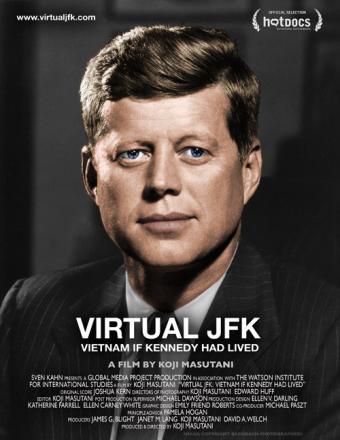PROVIDENCE, R.I. [Brown University] – If John F. Kennedy had lived, would the United States have fought in Vietnam?
The documentary film “Virtual JFK,” premiering April 23, 2008 at Toronto’s renowned Hot Docs Canadian International Documentary Festival, probes one of the most intriguing "what-ifs" in modern American history. A trailer of the 80-minute film can be viewed at http://www.youtube.com/watch?v=aqEJnVly8Jc&fmt=18
“Virtual JFK” had its genesis at Brown University in 2005, when James Blight, a professor of at the Watson Institute for International Studies and Janet M. Lang, an adjunct associate professor at the Watson Institute, began to revisit the Vietnam War after wrapping up the book and teaching guide to Errol Morris’s Academy-Award-winning documentary film “The Fog of War.”
The pair looked to Vietnam for lessons applicable to contemporary U.S. policy.
Blight said: “John Adams wrote to his wife Abigail in the mid-1790s, as war hawks in the U.S. were demanding that the U.S. go to war with France, ‘Great is the guilt of an unnecessary war.’ You might say this gem of wisdom, seen on bumper stickers in the 1960s, and also today, is the underlying theme, or motivation, for our movie and book on JFK and Vietnam.”
With David A. Welch of the University of Toronto, Blight and Lang began a book called “Virtual JFK,” which assessed the plausibility of counterfactuals – the academic term for “what-ifs” – and their possible outcomes.
In Koji Masutani ‘05, a visiting fellow at the Watson Institute with two Cannes films to his credit, Blight and Lang found the perfect new collaborator. Masutani directed the film and produced it with Blight, Lang, Welch, Peter O. Almond (“Thirteen Days”) and Michael Paszt (“Interview”).
“I graduated from Brown in 2005 looking to dive head - or belly- first into filmmaking, so we fit like hand in glove,” Masutani said. “Our skills inspired each other, and Janet and Jim's research in critical oral history provided the key data required to launch the film.”
Blight and Lang examined the Vietnam War not only through the lens of history but also through the lens of cognitive psychology. They examined newly declassified documents and tapes and unprecedented testimony by former officials of the Kennedy and Johnson administrations at a 2005 oral history conference.
The participants set out first to determine what actually happened, before speculating on what might have happened, regarding such issues as: what Kennedy thought he had decided on Vietnam; what his senior advisers believed he had decided; what Johnson believed was his predecessor’s Vietnam policy; and what new dilemmas Johnson faced that Kennedy was spared, such as the turbulent aftermath of the U.S.-endorsed November 1963 coup in Saigon.
Masutani’s complementary film centers on an important contemporary question, he said: “Does it matter who is president of the U.S. on issues of war and peace?” Drawing on unusual archival footage from presidential libraries and the National Archives, along with the newly deciphered audio tapes and other documentary evidence, “Virtual JFK” the film explores six situations Kennedy faced in which most of his advisers pushed for war.
“By examining a broad range of Kennedy's decisions, the film finds that the JFK who dealt with the Bay of Pigs, the Laos crisis, the Berlin Wall crisis, the Cuban missile crisis and the war in Vietnam is the same steely, cautious, prudent president throughout, all across the board,” Masutani said.
“Our findings have nothing to do with some fantastic ‘Camelot,’” said Blight, the film’s narrator. "Our findings derive from a portion of historical reality of which we have only recently become aware. And can we make the points we wish to make without seeming to preach about Bush and Iraq, letting viewers of the film and readers of the book draw their own conclusions? Time will tell whether we have succeeded.”
“Virtual JFK” has been praised for both its historical and cinematic content. “A compelling and extremely unusual approach to a possible history," said Atom Egoyan, Academy-Award-nominated director of “The Sweet Hereafter.”
"As my father repeated many times, any fool can start a war, but it takes truly wise leaders to avoid war,” said Sergei Khrushchev, son of former Soviet Prime Minister Nikita Khrushchev and a visiting fellow at the Watson Institute.“ ‘Virtual JFK’ is not merely a film, but a critical handbook for current and aspiring world leaders."
“The unspoken but clear point that I take away from ‘Virtual JFK,’” said Mark Garrison, former U.S. deputy ambassador to Moscow, “is that a president of JFK's caliber would not have taken the country into Iraq.”

